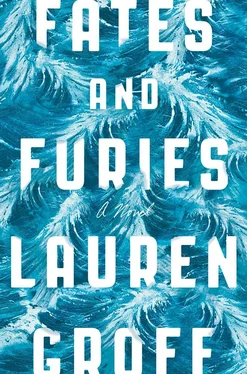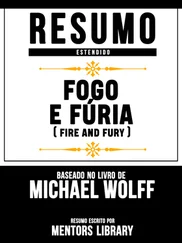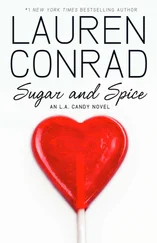She put the phone gently on the hook and unplugged it and went to take a second bath, her T-shirt having gone transparent with sweat. In a few days, she’d get the first of many notes that Antoinette would send her through the years, spiky with exclamation points. In return, Mathilde would send back photos of Lotto and Mathilde, smiling together; Lotto and Mathilde by the pool; Lotto and Mathilde in San Francisco; Mathilde in Lotto’s arms, stepping over every threshold of every new place they’d have. That evening when Lotto came back, she said nothing. They watched a sitcom. They took a shower together. Later, naked, they ate calzones.
TIME, AFTER LOTTO DIED, swallowed itself.
Sallie saw it was useless to try to get through; Mathilde was numb still. A force field of fury so thick nobody was going to get in. Sallie went back to Asia, to Japan this time. She’d return in a year, when Mathilde wasn’t so angry, she said.
“I’ll always be angry,” Mathilde said.
Sallie put her dry brown hand on Mathilde’s face and barely smiled.
Only Lotto’s sister returned again and again. Dear sweet Rachel, pure of heart. “Here’s an apple pie,” she’d say. “Here’s a loaf of bread. Here’s a handful of chrysanthemums. Here’s my daughter, hold her, salve your sorrow.” Everyone else gave her space . Gave her time.
“Christ, did you have any idea Mathilde could be such a bitch?” friends said, wounded, returning home. “Would you have guessed it when Lotto was alive? Can you believe what she said to us?”
“She’s possessed by some demon,” they said.
“Grief,” they all said knowingly, feeling profound. Tacitly agreed: they would return when she was her seemly, elegant, smiling self again. In their own place, they sent gifts. Samuel sent potted bromeliads. Chollie sent towers of Belgian chocolates. Danica sent her personal masseuse, whom Mathilde sent away by ignoring him. Arnie sent a case of wine. Ariel sent a long black dress in cashmere, which Mathilde curled for days within. Strange that this soft gift from an old boss would be the only perfect thing.
—
LATE ONE NIGHT Mathilde found herself on a long straight strip of road. The car a top-of-the-line Mercedes that Lotto had bought just before croaking. His mother had died half a year before her son, and they’d come into an inheritance so vast it was foolish they were driving their fifteen-year-old Honda Civic with the iffy airbags. He’d only ever cared about money when it came to his own comfort; otherwise, he left it for others to worry about.
She put the pedal to the floor. Responsive as fuck. The car shot to eighty, to ninety-five, to one-ten.
She flipped off the lights and the darkness rose to her like a daydream.
Moonless night. The car slack like a fish brushing along the walls of a cave. After one lifetime, she went stationary, suspended in darkness. Calm.
Her car hit the culvert, brushed up the embankment, vaulted a barbed-wire fence, somersaulted. It landed in a herd of sleeping Jerseys.
Mathilde’s mouth was bleeding. She’d bitten nearly through her tongue. No matter. She spoke to nobody these days. Otherwise, she was unhurt.
She climbed out of the car, swallowing the gushes of coppery heat. The heifers had moved off, were watching from the shelter of wind-block lindens. But one was still kneeling beside the car. When Mathilde walked around to it, there was a wall of blood where its neck had been.
She watched for a long time as it bled into the grass. There was nothing to be done.
There was nothing to be done and now what? Mathilde was forty-six. She was too young to be finished forever with love. Still in her prime. Fine-looking. Desirable. And uncoupled now, for good.
The story we are told of women is not this one.
The story of women is the story of love, of foundering into another. A slight deviation: longing to founder and being unable to. Being left alone in the foundering, and taking things into one’s own hands: rat poison, the wheels of a Russian train. Even the smoother and gentler story is still just a modified version of the above. In the demotic, in the key of bougie, it’s the promise of love in old age for all the good girls of the world. Hilarious ancient bodies at bath time, husband’s palsied hands soaping wife’s withered dugs, erection popping out of the bubbles like a pink periscope. I see you! There would be long, hobbledy walks under the plane trees, stories told by a single sideways glance, one word sufficing. Anthill, he’d say; Martini! she’d say; and the thick swim of the old joke would return to them. The laughter, the beautiful reverberations. Then the bleary toddling on to an early-bird dinner, snoozing through a movie hand in hand. Their bodies like knobby sticks wrapped in vellum. One laying the other on the deathbed, feeding the overdose, dying the day after, all heart gone out of the world with the beloved breath. Oh, companionship. Oh, romance. Oh, completion. Forgive her if she believed this would be the way it would go. She had been led to this conclusion by forces greater than she.
Conquers all! All you need is! Is a many-splendored thing! Surrender to!
Like corn rammed down goose necks, this shit they’d swallowed since they were barely old enough to dress themselves in tulle.
The way the old story goes, woman needs an other to complete her circuits, to flick her to fullest blazing.
[The refutation would come. During those dusky years of her eighties, in the far-off beyond-the-horizon, she would sit solitary over tea in her London breakfast room and look up to see her own hand like an ancient map and then out the window where a blue budgerigar peered in, naturalized citizen of this unnatural subtropical world. Suddenly clear, in the small blue shape, she would see her life had not been, at its core, about love. There had been terrific love in it. Heat and magic. Lotto, her husband. Christ, there had been him. Yet — yes! — the sum of her life, she saw, was far greater than its sum of love.]
In the immediacy, though, in stingy moonlight over bruised metal, cow flesh, glass, there was only her bitten tongue and all that blood. The hot rust-tasting flood of it. And the great Now What stretching without end.
ONE DAY, the little girl she once was, small Aurélie, found herself with a blue suitcase in her hand and her hair scraped back from her face. She must have been five or six.
“You’re off to your Paris grandmother’s,” her tall Breton grandmother said. There had always been something off about the Paris grandmother, something embarrassing; her own mother had never spoken of her; they had rarely talked on the phone. Aurélie had never met her. There were never pretty parcels from that grandmother on her saint’s day.
They were standing in the aisle of a train. The grandmother’s frown stretched to her second chin. “Your mother’s mother was the only relative who would take you,” she said.
“I don’t care,” Aurélie said.
“Of course you don’t,” the grandmother said. She gave her a packet of sandwiches and hard-boiled eggs, a jar of warm milk, two chaussons aux pommes , and pinned a note to her coat. “Don’t you dare move from your seat,” she said, and gave the girl a bristly kiss on the cheek and wiped the red rims of her eyes with a starched handkerchief and left.
The train hooted. All Aurélie knew of the world slid out from under her feet. The village: black-and-white cows, chickens, huge Gothic church, bakery. She saw what she was searching for when the train picked up speed. There. A flash. White hatchback parked under a yew. Oh, her mother standing cross-armed, pale, in a navy dress, her hair [yes, white-blond] under a scarf, watching the train go. Her mouth a red slash in the pale. Dress, hair beginning to froth in the train’s wind. It was hard to tell what was happening on her face. Then her mother was gone.
Читать дальше












